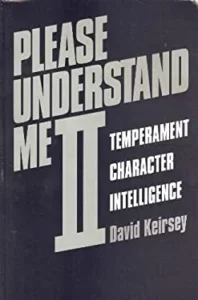A Review of “Please Understand Me Too: The Myers-Briggs Type Indicator” Book
 The book “Please Understand Me Too: The Myers-Briggs Type Indicator” provides a valuable resource for individuals seeking insights into their personalities and utilizing typology in therapy sessions. As an avid user of this book with my patients, I find it immensely helpful in understanding and analyzing different personality types. In this review, I will discuss the book’s content, its usability for therapists and clients, and address common misconceptions surrounding the Myers-Briggs Type Indicator (MBTI).
The book “Please Understand Me Too: The Myers-Briggs Type Indicator” provides a valuable resource for individuals seeking insights into their personalities and utilizing typology in therapy sessions. As an avid user of this book with my patients, I find it immensely helpful in understanding and analyzing different personality types. In this review, I will discuss the book’s content, its usability for therapists and clients, and address common misconceptions surrounding the Myers-Briggs Type Indicator (MBTI).
Content and Usability: “Please Understand Me Too” serves as a comprehensive guide to the MBTI, a well-known and widely used personality test. Although the enneagram test is gaining popularity in recent years, the MBTI remains a powerful tool for understanding personality types. What sets this book apart is its accessibility, making it suitable for individuals without extensive knowledge of MBTI’s intricate structure. The descriptions of the various personality types, though detailed and complex, are written in a way that is intuitive and easy to comprehend. This makes it convenient for therapists to incorporate typology concepts into their practice, even without extensive training.
The book includes a test that accompanies it, although some of the language used in the test may feel dated or reminiscent of the 1980s. However, it is possible to use a newer MBTI test from a reputable source, provided it is not one of the simplistic versions available online. For a more accurate assessment, it is advisable to utilize a test backed by organizations specializing in typology research. Upon identifying one’s personality type, the book offers extensive breakdowns that explore the implications of each type on various aspects of life, including relationships and career goals. While not all aspects may resonate entirely, the insights provided are generally valuable. It is important to note that the MBTI is not an all-encompassing horoscope or a rigid categorization tool. Instead, it highlights the thinking modes in which individuals are most comfortable, indicating areas of strength and potential challenges. Therapy models that incorporate typology work aim to help individuals become more comfortable with their inferior thinking modes, fostering personal growth and adaptability.
Addressing Misconceptions:
Misconceptions surrounding the MBTI often arise from its misuse or a failure to understand its purpose. It is not merely a generalized net that individuals try to fit themselves into to find some resemblance, nor does it confine people to predetermined boxes. Instead, the MBTI measures an individual’s preferred modes of thinking and does not deem any mode as inherently good or bad. Therapy, in essence, teaches individuals to be more comfortable with thinking modes they are less proficient in, allowing for a broader range of cognitive flexibility and problem-solving.
Conclusion: In conclusion, “Please Understand Me Too: The Myers-Briggs Type Indicator” is an excellent book that provides accessible insights into typology and the MBTI. While other books delve deeper into typology concepts, this book serves as a valuable starting point, especially for therapists and individuals seeking to understand personality types. It is essential to approach the MBTI with an open mind, recognizing its purpose in identifying thinking preferences rather than rigidly defining individuals. By embracing the potential of all thinking modes, individuals can cultivate personal growth and navigate their lives more effectively.
Did you enjoy this article? Checkout the podcast here: https://gettherapybirmingham.podbean.com/
Bibliography:
Eliade, M. (1959). The Sacred and the Profane: The Nature of Religion. Translated by Willard R. Trask. Harcourt Brace Jovanovich.
Further Reading:
Campbell, J. (2008). The Hero with a Thousand Faces. New World Library.
Durkheim, E. (1995). The Elementary Forms of Religious Life. Translated by Karen E. Fields. Free Press.
Freud, S. (1989). The Future of an Illusion. Translated by James Strachey. W. W. Norton & Company.
Geertz, C. (1973). The Interpretation of Cultures. Basic Books.
Jung, C. G. (1968). Man and His Symbols. Dell Publishing.
Lévi-Strauss, C. (1963). Structural Anthropology. Translated by Claire Jacobson and Brooke Grundfest Schoepf. Basic Books.
Malinowski, B. (1954). Magic, Science and Religion and Other Essays. Doubleday Anchor Books.
Otto, R. (1958). The Idea of the Holy. Translated by John W. Harvey. Oxford University Press.
Pals, D. L. (2006). Eight Theories of Religion. Oxford University Press.
Taylor, C. (2007). A Secular Age. Belknap Press of Harvard University Press.
Tillich, P. (2001). Dynamics of Faith. Perennial.
Turner, V. (1995). The Ritual Process: Structure and Anti-Structure. Aldine Transaction.
Weber, M. (1993). The Sociology of Religion. Translated by Ephraim Fischoff. Beacon Press.
Wulff, D. M. (1997). Psychology of Religion: Classic and Contemporary. Wiley.
How the Shadow Shows up in Dreams


























0 Comments